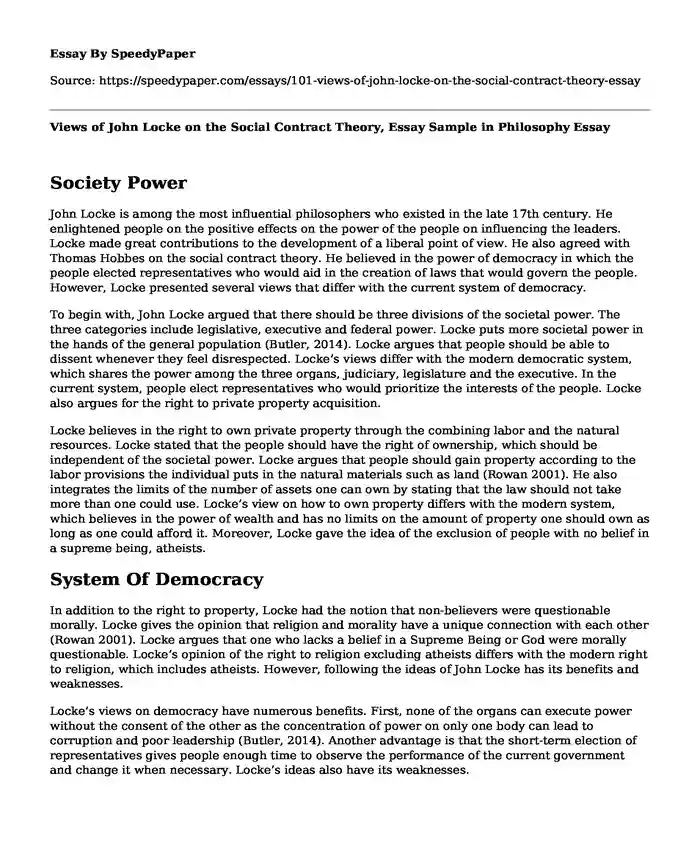
| Type of paper: | Essay |
| Categories: | Philosophy Philosophers |
| Pages: | 3 |
| Wordcount: | 674 words |
Society Power
John Locke is among the most influential philosophers who existed in the late 17th century. He enlightened people on the positive effects on the power of the people on influencing the leaders. Locke made great contributions to the development of a liberal point of view. He also agreed with Thomas Hobbes on the social contract theory. He believed in the power of democracy in which the people elected representatives who would aid in the creation of laws that would govern the people. However, Locke presented several views that differ with the current system of democracy.
To begin with, John Locke argued that there should be three divisions of the societal power. The three categories include legislative, executive and federal power. Locke puts more societal power in the hands of the general population (Butler, 2014). Locke argues that people should be able to dissent whenever they feel disrespected. Locke’s views differ with the modern democratic system, which shares the power among the three organs, judiciary, legislature and the executive. In the current system, people elect representatives who would prioritize the interests of the people. Locke also argues for the right to private property acquisition.
Locke believes in the right to own private property through the combining labor and the natural resources. Locke stated that the people should have the right of ownership, which should be independent of the societal power. Locke argues that people should gain property according to the labor provisions the individual puts in the natural materials such as land (Rowan 2001). He also integrates the limits of the number of assets one can own by stating that the law should not take more than one could use. Locke’s view on how to own property differs with the modern system, which believes in the power of wealth and has no limits on the amount of property one should own as long as one could afford it. Moreover, Locke gave the idea of the exclusion of people with no belief in a supreme being, atheists.
System Of Democracy
In addition to the right to property, Locke had the notion that non-believers were questionable morally. Locke gives the opinion that religion and morality have a unique connection with each other (Rowan 2001). Locke argues that one who lacks a belief in a Supreme Being or God were morally questionable. Locke’s opinion of the right to religion excluding atheists differs with the modern right to religion, which includes atheists. However, following the ideas of John Locke has its benefits and weaknesses.
Locke’s views on democracy have numerous benefits. First, none of the organs can execute power without the consent of the other as the concentration of power on only one body can lead to corruption and poor leadership (Butler, 2014). Another advantage is that the short-term election of representatives gives people enough time to observe the performance of the current government and change it when necessary. Locke’s ideas also have its weaknesses.
On the other hand, Locke’s ideas have several disadvantages. First, Locke’s idea of the right of owning property may result in a civil war as people may take property forcibly from others (Butler, 2014). Locke’s ideas also justify war on property hence would not be under the jurisdiction of the laws governing the people.
In conclusion, John Locke was one of the most prominent philosophies. Some of Locke’s ideas, such as societal power sharing between three organs are still in practice. Throughout the years, scholars believe that Locke’s religious beliefs motivated most of his philosophical ideas. Scholars prove this point by arguing that Locke believed in tolerance among the people but disapproved tolerance on the atheists. As noted above, the current system of democracy made several adjustments on Locke’s ideas.
References
Butler, B. (2014). From Social Contract Theory to Sociable Contract Theory. Contemporary Pragmatism, 11(2), 1-17. http://dx.doi.org/10.1163/18758185-90000287
Rowan, J. (2001). The Moral Basis for Contract Rights. Journal Of Social Philosophy, 32(3), 431-445. http://dx.doi.org/10.1111/0047-2786.00105
Cite this page
Views of John Locke on the Social Contract Theory, Essay Sample in Philosophy. (2018, May 15). Retrieved from https://speedypaper.com/essays/101-views-of-john-locke-on-the-social-contract-theory-essay
Request Removal
If you are the original author of this essay and no longer wish to have it published on the SpeedyPaper website, please click below to request its removal:
- Nursing Essay Sample: Interaction Technique Analysis
- Mary Shelley's Frankenstein: Nature vs. Nurture. Literary Essay Sample.
- Regression and Correlation, Essay Sample on Data Analysis
- Markets and Morals, Book Review Essay Example
- Business Essay Example: Nvidia's Case Study
- "Daddy" and "Lady Lazarus" - Free Essay Analyzing Sylvia Plath's Poems
- Application Essay for Stanford University. Paper Example
Popular categories




